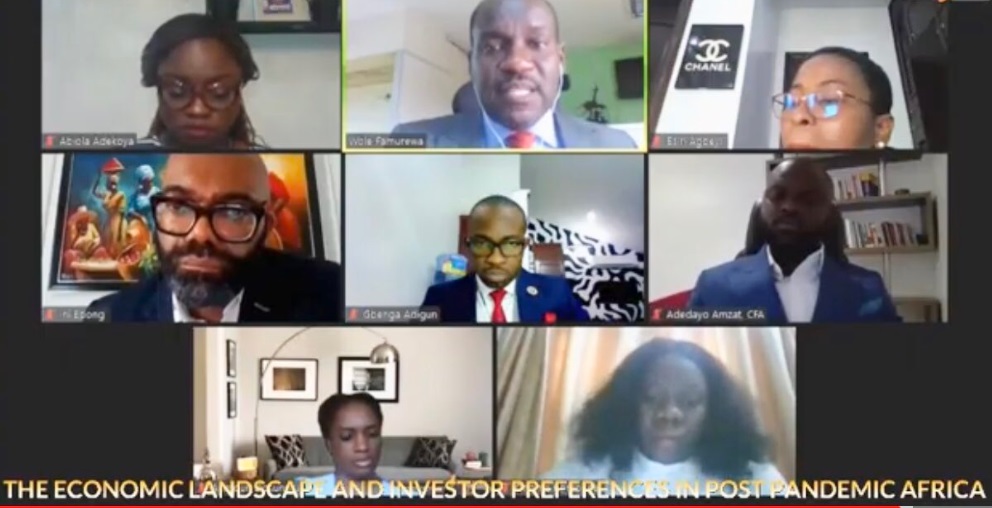Economy
Experts Seek Reorganization of Nigeria’s Financial Market Structure

By Modupe Gbadeyanka
The urgent need for the reorganisation of the present structure of the financial market in Nigeria has been stressed by stakeholders in the Nigerian capital market, asset management and banking sectors.
One of the experts, Mr Gbenga Adigun, the Business Head of Zimvest, noted that investors are gravely concerned with investment returns in light of the current low yield environment, while financial institutions are thinking of how their product development and service delivery should evolve with the changing needs of investors.
Mr Adigun gave this submission at the Zimvest Economy Conversations, a thought-leadership series of Digital Private Wealth and Investment Management Firm, Zimvest (Zedcrest Investment Managers), held on Saturday, June 20, 2020.
He and others agreed that there was an urgent need for a rethink of the nation’s economic philosophy and a reset of the financial market architecture.
The CEO of FMDQ Group, Mr Bola Onadele Koko, while delivering the keynote speech on the event theme The Economic Landscape and Investor Preferences in Post-pandemic Africa, highlighted the impact of the growing pandemic on African markets.
He laid emphasis on the slowdown in key segments of the economy including the financial markets, tourism, remittances and foreign direct investments. He called for a rethink of Nigeria’s economic philosophy with clarity from the fiscal policymakers which will be critical for gaining investors’ confidence.
“Now is the time to develop new and ingenious ways to develop and drive the Nigerian financial market and in the continent at large.
Private capital will especially be more essential as recent shocks have shown the limits of Governments’ abilities particularly in developing countries,” he said.
The capital market leader also stated that FX reforms will be critical for the Nigerian economy at this point, noting that trading activity in the Nigerian Fixed-Income and Interbank Currencies market was down by 55 percent due to economic slowdown linked to the COVID-19 pandemic.
All panellists in this first episode of the thought-leadership series pointed out that most investors were affected by the pandemic and are looking for further ways to diversify their portfolios that may end the year on a negative real return.
Speaking during the panel session, Ms Abiola Adekoya, a wealth expert and former CEO of RMB Securities, stated that one of the key things that investors are concerned about in this era is the need for diversification, more liquidity and higher investment returns.
“A lot of investors have been focused on one product and this pandemic has shown that that is not enough. The nascent interest in alternative assets have shown that there is strong liquidity in the overlooked retail space and investment managers should pay keen attention and develop alternative assets products, and reduce the reliance on the traditional fixed income, money markets and equities offerings,” she said.
Echoing Ms Adekoya’s thoughts on alternative assets was Ms Esiri Agbeyi, a partner and Head Private Wealth Services at PwC Nigeria, who emphasised the need for investors to take a keen interest in private equity and other alternative assets investments.
She shared a PWC survey on Family Offices. The survey revealed that 63 percent of family businesses leaned towards private equity as an investment portfolio. Local pools of private capital are important to drive economic development
On her part, the Divisional Head of Central Securities Clearing System (CSCS), Ms Onome Komolafe, stated the need for improved product development and differentiation, clear market segmentation and smart communication as tools that financial services firms can deploy in evolving with the changing consumer behaviour.
She also pointed to premium service delivery and technological innovation as crucial to democratization of investment opportunities in Africa.
The Group Executive, Treasury & Financial Institutions at First Bank, Mr Ini Ebong, pointed out the present opportunity available for investors, regulators, institutions, market practitioners to reset Nigerian financial market architecture. He noted that this opportunity presents itself mostly around periods of crisis.
According to him, as markets develop, the investing public becomes more able to embrace risk and go for higher return instruments outside traditional bank-based deposits.
“If you want high returns on investment, you must be willing to take on more risky investment products”, said Adetoun Dosunmu, Treasurer at FBN Merchant Bank. “Giving the highly specialized nature of investing, working with a regulated fund manager will be most beneficial to the investor in the long run and would protect against fraud and sharp practices from the teeming number of platforms offering untested investment opportunities”.
During his closing remark, the founder of Zedcrest Group and the chief host of the event, Mr Saheed Adedayo Amzat, called on the Nigerian capital market stakeholders to unite to further capital formation in the country. He sounded a note of warning to Nigerians on suspicious wealth generation platforms.
“Many unsuspecting investors over the last three decades have lost their funds to unregulated institutions that promised unbelievable returns.
“All stakeholders in the sector need to speak up and inform the unsuspecting public about investment platforms. Our regulators need to do more with the support of all players in the Investment management space,” he opined.
The much-anticipated event lived up to its billings as over 1,150 participants engaged the speakers on investment challenges and opportunities they can tap into post-COVID-19.
Zimvest, the newly launched Investment Management subsidiary of Zedcrest, plans to be at the nexus of a continuing conversation series around Investment management and economic policy landscapes. The second edition of the series is to be announced soon.
A poll conducted during the event also shows that over 60 percent of participants prioritized Capital Preservation when choosing an investment option.
Over 72 percent were concerned about inflation and exchange rate fluctuations and over 81 percent were concerned about Proven Track Record, Regulatory Compliance and Transparency when choosing an investment management partner. The session ended at exactly 1pm on the day.
A replay of this session can be watched via: https://zoom.us/rec/play/upcscbr–z83GtOSuQSDBqcvW9W0e6KsgCVI__dYy0yyWiNQNlShYbAaMLScQgqeV7fIjyl2RsrXPBOZ
Economy
NASD Exchange Rises 1.22% on Sustained Bargain-Hunting

By Adedapo Adesanya
Strong appetite for unlisted stocks further raised the NASD Over-the-Counter (OTC) Securities Exchange by 1.22 per cent on Friday, February 27.
Data revealed that the NASD Unlisted Security Index (NSI) was up by 49.41 points to 4,083.87 points from 4,034.46 points, and lifted the market capitalisation by N19.56 billion to N2.433 trillion from N2.413 trillion.
The volume of securities bought and sold by investors increased by 243.0 per cent to 4.5 million units from 1.3 million units, and the number of deals grew by 15.8 per cent to 44 deals from 38 deals, while the value of securities went down by 19.7 per cent to N82.5 million from N102.8 million.
Central Securities Clearing System (CSCS) Plc ended the session as the most active stock by value on a year-to-date basis with 35.0 million units valued at N2.1 billion, followed by Okitipupa Plc with 6.3 million units worth N1.1 billion, and Geo-Fluids Plc with 122.8 million units transacted for N480.4 million.
Resourcery Plc ended the day as the most traded stock by volume on a year-to-date basis with 1.05 billion units sold for N408.7 million, followed by Geo-Fluids Plc with 122.8 million units valued at N480.4 million, and CSCS Plc with 35.0 million units traded for N2.1 billion.
There were six price gainers yesterday led by FrieslandCampina Wamco Nigeria Plc, which added N9.02 to close at N111.46 per unui compared with the previous day’s N102.44 per unit, Nipco Plc appreciated by N6.00 to N284.00 per share from N278.00 per share, CSCS Plc recouped N1.87 to sell at N70.12 per unit versus Thursday’s value of N68.25 per unit, Geo-Fluids Plc improved by 17 Kobo to close at N3.18 per share versus N3.01 per share, Industrial and General Insurance (IGI) Plc advanced by 5 Kobo to sell at N50 Kobo per unit versus the preceding day’s 45 Kobo per unit, and Acorn Petroleum Plc chalked up 2 Kobo to settle at N1.34 per share, in contrast to the previous day’s N1.32 per share.
Economy
FX Liquidity Crunch Sinks Naira to N1,363/$1 at NAFEX, N1,370/$1 at Black Market

By Adedapo Adesanya
The Naira performed poorly against the United States Dollar in the different segments of the foreign exchange (FX) market on February 27, closing the week without a gain.
In the black market, the domestic currency weakened against the Dollar yesterday by N5 to close at N1,370/$1 compared with Thursday’s closing price of N1,365/$1, and at the GT Bank forex desk, it lost N2 to sell N1,369/$1 versus the N1,367/$1 it was sold a day earlier.
Yesterday, the Nigerian Naira lost N3.75 or 0.26 per cent against the greenback at the Nigerian Autonomous Foreign Exchange Market (NAFEX) to trade at N1,363.39/$1 compared with the previous day’s N1,359.82/$1.
Also, the Naira depreciated against the Euro at the official market during the session by N2.33 to quote at N1,609.22/€1 versus N1,606.89/€1, and appreciated against the Pound Sterling by N6.74 to settle at N1,836.49/£1 compared with the preceding session’s N1,843.23/£1.
The Naira’s latest depreciation occurred as FX demand continued to outpace available supply, intensifying pressure in the market.
In response to the negative momentum, the Central Bank of Nigeria (CBN) intervened by selling Dollars to banks and other authorised dealers in an effort to stabilise the local currency. The move came barely a week after the apex bank had purchased about $190 million from the foreign exchange market to temper the Naira’s rally.
Specifically, the CBN injected $200 million into the official market between Tuesday and Wednesday through an intervention call. However, the liquidity support proved insufficient to reverse the currency’s downward trend.
Meanwhile, the cryptocurrency market declined on Friday, with Solana (SOL) down by 10.4 per cent to $78.60, as Dogecoin (DOGE) decreased by 9.5 per cent to $0.0982.
Further, Cardano (ADA) slumped 8.9 per cent to $0.2647, Ethereum (ETH) slipped by 8.6 per cent to $1,859.10, Ripple (XRP) shrank by 8.2 per cent to $1.30, Litecoin (LTC) lost 1.4 per cent to close at $52.39, Bitcoin (BTC) slid 5.9 per cent to $63,686.39, and Binance Coin (BNB) went down by 4.9 per cent to $596.64, while the US Dollar Tether (USDT) and the US Dollar Coin (USDC) traded flat at $1.00 apiece.
Economy
Oil Prices Climb on Geopolitical Anxiety

By Adedapo Adesanya
Oil prices rose about 2 per cent on Friday, with traders bracing for supply disruptions as nuclear talks between the United States and Iran were without an agreement.
Brent crude futures settled at $72.48 a barrel after chalking up $1.73 or 2.45 per cent, while US West Texas Intermediate crude futures finished at $67.02 a barrel, up $1.81 or 2.78 per cent.
The two sides agreed to extend indirect negotiations into next week, but traders grew sceptical that an agreement between US President Donald Trump’s administration and Iran was possible.
The US and Iran held indirect talks in Geneva on Thursday after Mr Trump ordered a military buildup in the region.
Oil prices gained during the talks, on media reports indicating that discussions had stalled over U.S. insistence on zero enrichment of uranium by Iran. However, prices eased after the mediator from Oman said the two sides had made progress.
They plan to resume negotiations with technical-level discussions scheduled next week in Vienna, Omani Foreign Minister Sayyid Badr Albusaidi said on X.
Market analysts noted that geopolitical risk premiums of $8 to $10 a barrel have been built into oil prices on fears that a conflict will disrupt Middle East supply through the Strait of Hormuz, where about 20 per cent of global oil supply passes.
To cushion the impact from a possible strike, one of the world’s largest oil producers, the United Arab Emirates (UAE), is set to export more of its flagship Murban crude in April, while Saudi Arabia said it would also increase oil production.
Additionally, Saudi Arabia may raise its April crude price to Asia for the first time in five months due to higher demand from India to replace Russian supplies, potentially raising it by about $1 a barrel.
Meanwhile, the Organisation of the Petroleum Exporting Countries and its allies (OPEC+) is likely to consider raising oil output by 137,000 barrels per day for April at its March 1 meeting, after suspending production increases in the first quarter.
The resumption of output increases after a three-month pause would allow Saudi Arabia and the UAE to regain market share at a time when other OPEC+ members, such as Russia and Iran, contend with Western sanctions while Kazakhstan recovers from a series of oil production setbacks.
Eight OPEC+ producers – Saudi Arabia, Russia, the United Arab Emirates, Kazakhstan, Kuwait, Iraq, Algeria and Oman will meet at the meeting on Sunday.
-

 Feature/OPED6 years ago
Feature/OPED6 years agoDavos was Different this year
-
Travel/Tourism10 years ago
Lagos Seals Western Lodge Hotel In Ikorodu
-

 Showbiz3 years ago
Showbiz3 years agoEstranged Lover Releases Videos of Empress Njamah Bathing
-

 Banking8 years ago
Banking8 years agoSort Codes of GTBank Branches in Nigeria
-

 Economy3 years ago
Economy3 years agoSubsidy Removal: CNG at N130 Per Litre Cheaper Than Petrol—IPMAN
-

 Banking3 years ago
Banking3 years agoSort Codes of UBA Branches in Nigeria
-

 Banking3 years ago
Banking3 years agoFirst Bank Announces Planned Downtime
-

 Sports3 years ago
Sports3 years agoHighest Paid Nigerian Footballer – How Much Do Nigerian Footballers Earn











